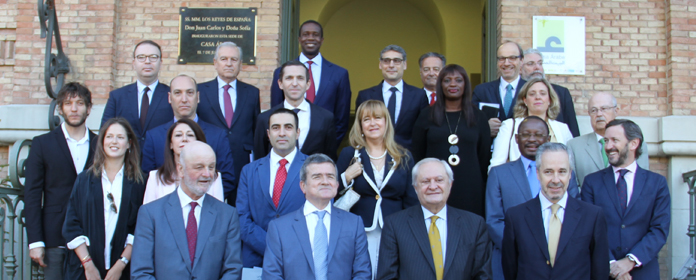A hundred of attendees, entrepreneurs and representatives of Spanish institutions participated in the event ‘Africa, a present reality’
The event, co-organized by the NCID together with the Ministry of Foreign Affairs, emphasized the huge potential of the Continent for the Spanish and European companies

FOTO: José Manuel Cuevas
Africa is not one single entente, but many realities, and ignoring the potential of a continent only 14 kilometers from the Spanish coast would be a mistake. That was the main conclusion of the event ‘Africa, a present reality’ organized by the Ministry of Foreign Affairs, the European Union and Cooperation of the Government of Spain jointly with the Navarra Center for International Development (NCID), a research center of the Institute for Culture and Society of the University of Navarra.
The event was held last Thursday, May 30, at Casa Árabe in Madrid and brought together a hundred assistants, which listened carefully to a dozen businessmen and representatives of Spanish public institutions, which debated the different trends of African countries. The Spanish Secretary of State for Foreign Affairs presided the event.
The inaugural lecture was given by Stefan Dercon, director of the Center for the Study of the African Economies of the University of Oxford, who focused on breaking the dogma of interventionism or liberalism in his inaugural lecture. "A mature state is one that knows what it can and can not do. The policies that really aim to reduce poverty go beyond the perspective of State vs. free market, "said Dercon.
After him came the three round tables. The first, on the strength of institutions and governance, was initiated by Ramón Gil-Casares, Spain's ambassador to Egypt, who emphasized the need to trustthe youth: "Violent changes have never worked, we must support the youth. The average age in Sub-Saharan Africa is 20 years and that of the leaders is 62 years", expressed Gil-Casares.
The second round table focused on migrations between African countries and from rural to urban areas. The city of Lagos in Nigeria already has 22 million people and the danger of overcrowding cities and not having the capacity to absorb the demand of population is real. "The solution is to develop the rural area, not everyone should enter the cities, because it would also damage the environment," said the director of the Center for Mediterranean Integration of the World Bank, Blanca Moreno-Dodson.
Also, Carlos Reyes, Head of African funds at the International Finance Corporation of the World Bank, highlighted the importance of sustainable investment and the impact on opportunities, as well as the opportunity for Spanish companies of the demographic boom. "The fact that more children are being born in Nigeria than in all of Western Europe is important. If I'm a diaper company like Dodot, I'll have to pay attention there,” he said.
The last round table brought together entrepreneurs from different fields who discussed the business opportunities in Africa. The CEO of BDK Group, Vasco Duarte-Silva, highlighted the diversity in the continent. "Talking about African bonds is like talking about European bonds. Greeks or Germans? Because they are not the same. Talking about Africa as a country gives me panic, because it is a culturally richer continent than Europe,” said Duarte-Silva.
With an average age of 18 in Sub-Saharan Africa, an increasingly young, educated and urban population offers a vast range of opportunities that Spanish companies should not look aside. Investing in African markets will turn those opportunities into realities. Why not put a start, for example, with diapers.
